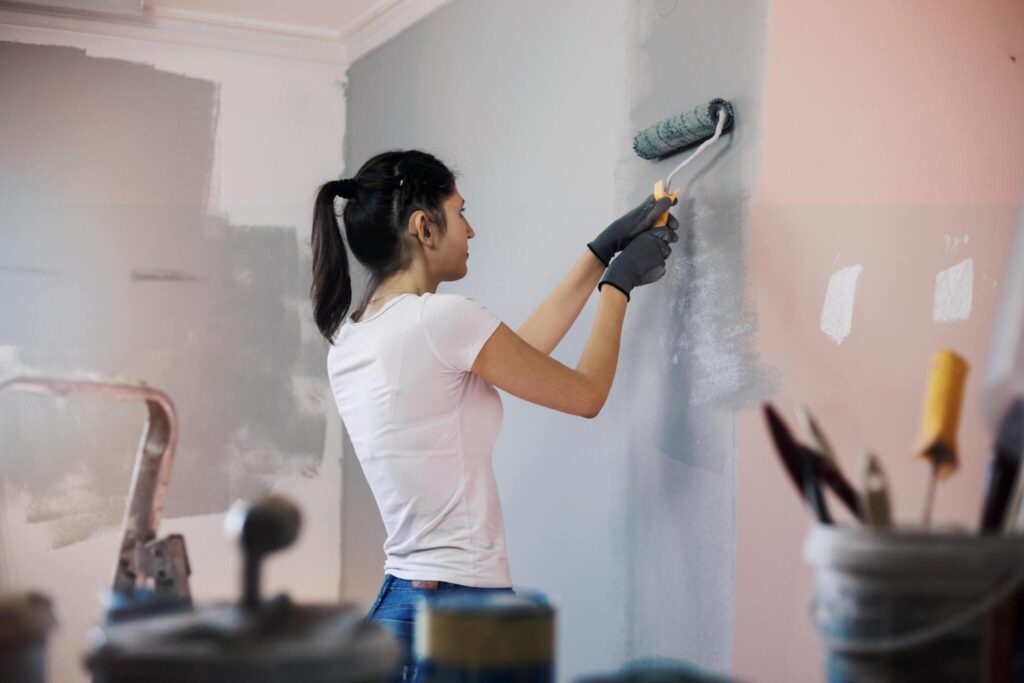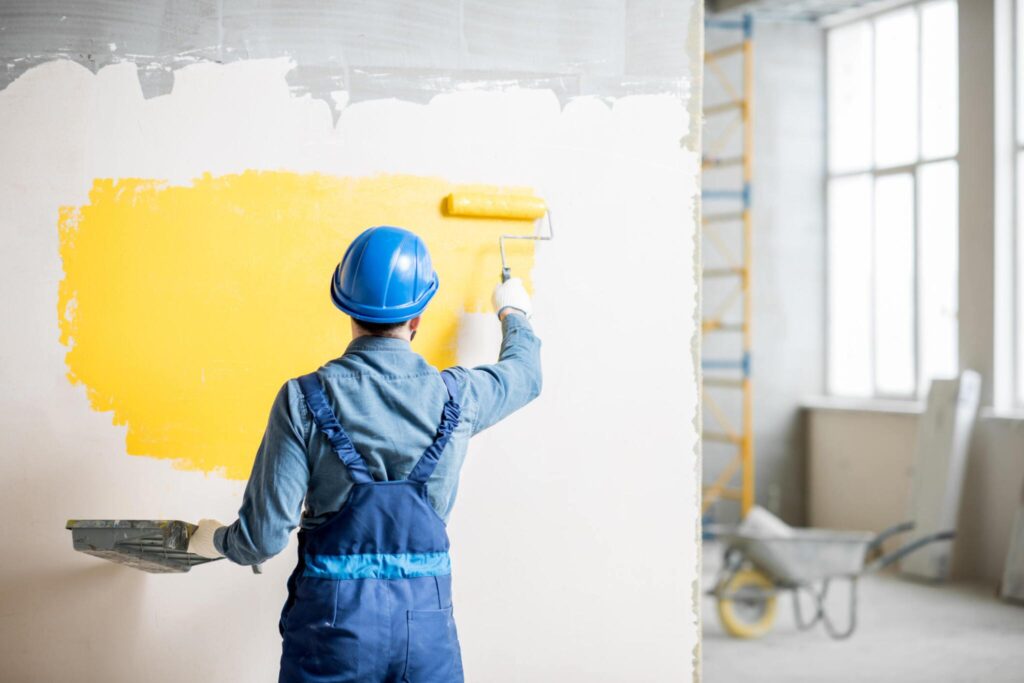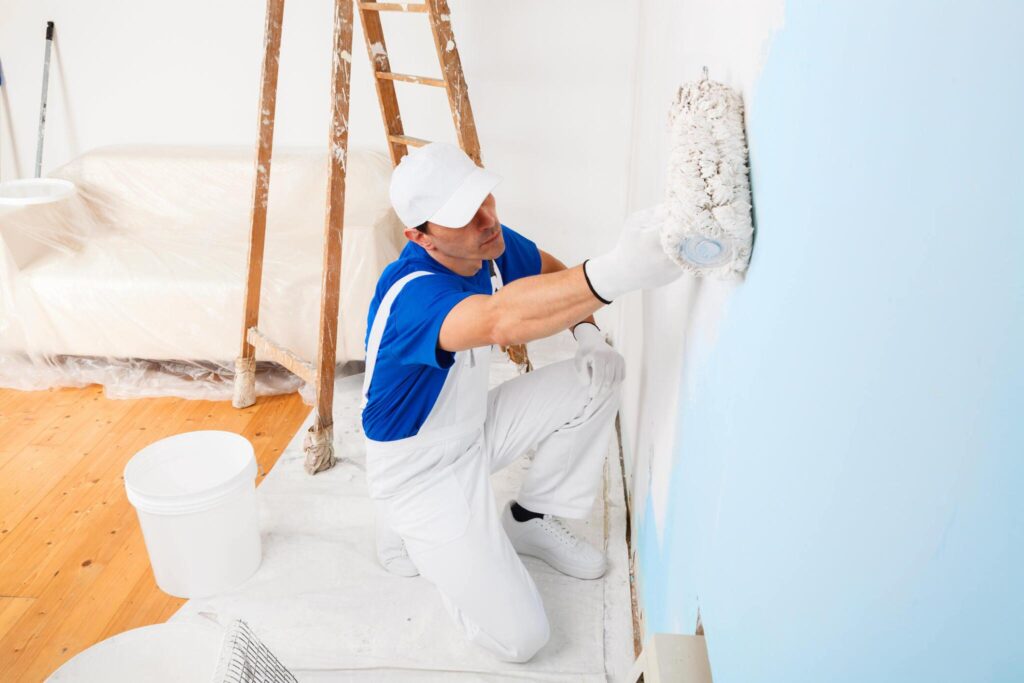Are you planning to give your home a fresh coat of paint? Whether it’s a small touch-up or a complete makeover, hiring the right painting contractor is crucial to ensure the success of your project. Painting contractors can transform your space and enhance its aesthetic appeal, but not all contractors are created equal. To help you make an informed decision, we’ve compiled a list of ten essential questions to ask painting contractors before hiring them. By asking these questions, you can ensure your painting project goes smoothly and meets your expectations.
Table of Contents
- Why Hire a Professional Painting Contractor?
- Risks of DIY House Painting
- 10 Essential Questions to Ask Painting Contractors
- How to Identify Red Flags When Hiring Painting Contractors
- Frequently Asked Questions (FAQs)
Key Takeaways
- Professional painting contractors like Custom Colonial Painting offer quality and efficiency.
- Ensure contractors are licensed and insured.
- Experience and references are crucial in assessing a contractor’s capability.
- Understand the full scope of services and warranties offered.
- Clear communication and detailed estimates are key.
- Consider additional services that may enhance your project.
Why Hire a Professional Painting Contractor?

Detailed Knowledge and Skill Set
Professional painting contractors comprehensively understand various paint types, applications, and technologies. This knowledge is crucial for deciding which materials best suit specific environments and surfaces. For instance, they know which paints are most durable for high-traffic areas or best for damp conditions. This expertise ensures that the chosen materials will look good, last longer, and perform better under various conditions.
Advanced Tools and Equipment
Painting contractors come equipped with advanced tools most homeowners don’t own. This includes professional-grade brushes, rollers, sprayers, and safety gear – painting essentials needed to achieve a smooth, even finish, especially in hard-to-reach areas. Their investment in the right tools means that the work is not only of higher quality but also completed more efficiently.
Proper Surface Preparation
One of the most critical steps in any painting project is proper surface preparation, and this is where painting contractors excel. They know how to prepare surfaces correctly to ensure the best paint adhesion and longevity. This can include aspects that are often overlooked in DIY projects, such as cleaning, sanding, priming, and repairing flaws. Proper preparation is key to preventing future issues such as peeling and cracking.
Attention to Detail
Professional painting contractors are known for their meticulous attention to detail. They take the time to protect your furniture, flooring, and fixtures to ensure clean lines and uniform coverage. This level of attention is often difficult to achieve for DIY painters and can make a significant difference in the overall look of the finished project.
Stress-Free Experience
Finally, hiring professional painting contractors near you offers a stress-free experience. They handle all aspects of the job, from the initial preparation to the final cleanup, allowing you to relax and not worry about the logistics of the painting project. This peace of mind is a significant advantage, especially for those with busy schedules or those who may not be physically able to undertake a painting project themselves.
Risks of DIY House Painting

While the idea of tackling a painting project on your own can be appealing, it’s essential to understand the risks associated with the DIY approach. Hiring professional painting contractors, like Custom Colonial Painting in Durham, CT, can be safer and more efficient for various reasons.
1. Quality Compromises
DIY painters may lack the expertise needed to achieve a professional finish. Issues such as uneven paint application, visible brush strokes, and color inconsistencies can arise. These imperfections affect the overall look and may lead to additional expenses for touch-ups or even a complete repaint.
2. Wasted Time and Resources
Taking on a painting project without professional guidance can waste time and resources. Inexperienced individuals often spend more time than expected, which disrupts daily routines. Additionally, buying subpar materials or inadequate tools can result in unforeseen expenses, negating any initial cost savings.
3. Safety Hazards
Painting frequently involves working at heights, which can pose significant safety hazards. DIY painters without the proper equipment or training may risk accidents and injuries, such as falls from ladders or scaffolding. Professional painting contractors prioritize safety and are equipped to handle such tasks securely.
4. Potential Property Damage
Inexperienced individuals can accidentally damage property during DIY projects. Spills, stains, and unintentional damage to floors, carpets, or furniture can be challenging and costly. Professional contractors take precautions to protect your belongings to prevent issues like these.
5. Lack of Warranty or Guarantee
Hiring professional painting contractors typically requires a warranty or guarantee for their work. This assurance means that if issues arise after the project is completed, the contractor will return to rectify them at no additional cost. In contrast, DIY projects or hiring non-professionals often lack such guarantees, leaving you responsible for addressing any problems that may arise.
10 Essential Questions to Ask Painting Contractors

When hiring a painting contractor, asking the right questions is key to ensuring a successful and stress-free experience. Here are ten essential questions to help you decide and choose the best painting contractor for your needs.
1. Are You Licensed and Insured?
One of the most critical questions you should ask any painting contractor is whether they are licensed and insured. A valid license indicates that the contractor has met specific requirements, possesses the necessary expertise, and is legally permitted to perform painting work in your area.
Additionally, insurance safeguards both you and the contractor in case of accidents or damages during the project. Requesting and verifying proof of their license and insurance is crucial to ensure you work with a legitimate and responsible professional. Hiring an unlicensed or uninsured contractor could lead to costly legal and financial consequences.
2. Can You Provide References and Past Projects?
To gain confidence in your chosen painting contractor, ask for references and examples of their previous painting projects. This step allows you to assess the quality of their work and provides valuable insights into their reputation and reliability. Reputable painting contractors will be more than willing to share their portfolios and testimonials from satisfied clients.
Take the time to contact these references and ask about their experiences, including the contractor’s professionalism, work quality, and adherence to timelines. This firsthand feedback can help you make an informed decision and ensure you’re entrusting your project to capable hands.
3. What Type of Paint and Materials Do You Use?
Understanding the paint and materials a contractor plans to use is essential for achieving a durable and visually appealing result. Inquire about the brand and type of paint they intend to apply and the quality of other materials, such as primers, brushes, and rollers.
High-quality paints and materials are crucial for ensuring a long-lasting finish that withstands the test of time. Additionally, ask about their commitment to using paints with low volatile organic compounds (VOCs), as this reduces environmental impact and promotes healthier indoor air quality for your home.
4. Do You Provide a Detailed Estimate?
Transparency in project costs is key to a successful partnership with a painting contractor. Request a detailed, written estimate that thoroughly outlines the scope of work. This estimate should include a breakdown of costs, including labor, materials, and any potential additional charges.
Having a comprehensive estimate enables you to understand the total project cost clearly, allowing you to budget effectively and prevent any unwelcome financial surprises. A trustworthy contractor will gladly provide a transparent estimate to ensure that you’re on the same page.
5. What Is the Timeline for the Project?
Understanding the expected timeline for your painting project is crucial for planning and minimizing disruptions to your daily life. Inquire about the contractor’s projected start date, as well as their estimated completion date.
This information helps you coordinate your schedule accordingly and ensures that you and the contractor have realistic expectations. An experienced and organized contractor can provide a clear timeline, allowing you to plan for the project with confidence.
6. Do You Offer a Warranty or Guarantee?
Reputable painting contractors should stand behind their workmanship and offer a warranty or guarantee. Inquire about the specifics of their warranty, such as the duration and what it covers. A warranty provides you with added peace of mind, knowing that if any issues arise related to the quality of their work, they will address them at no additional cost.
A contractor who offers a robust warranty demonstrates their commitment to delivering exceptional results. Be sure to request written documentation of the warranty terms for your records and future reference.
7. What Preparation and Cleanup Services Do You Provide?
Understanding the extent of preparation and cleanup services a painting contractor offers is crucial for a hassle-free project experience. Inquire about their approach to preparing surfaces before painting, including any repairs, priming, or sanding that may be required.
Additionally, discuss their post-painting cleanup procedures, such as removing paint residues, masking tape, and drop cloths. A contractor who takes care of these details ensures that your space is left in pristine condition, and you won’t be left with a mess to clean up once the project is completed.
8. Can You Provide a Written Contract?
Always insist on a written contract outlining all the project details, including the scope of work, materials, costs, timelines, payment schedules, and other relevant terms and conditions. A well-drafted contract is a legally binding document that protects you and the contractor. It also clarifies and ensures that both parties know their responsibilities and obligations.
Never proceed with a project based solely on verbal agreements or handshake deals, as these can lead to misunderstandings and disputes down the road. A written contract protects against potential issues and should be reviewed and signed by both parties before the work starts.
9. How Do You Handle Unforeseen Issues or Changes?
During a painting project, unforeseen issues or changes may arise and it’s essential to understand how the contractor handles such situations. Inquire about their process for addressing unexpected challenges, whether related to the condition of the surfaces, color changes, or additional work that may be required.
Understanding how these issues are managed will help you gauge the contractor’s flexibility and problem-solving abilities. A reliable contractor should communicate openly and work collaboratively with you to find solutions while minimizing delays and additional costs.
10. What Payment Options Do You Accept?
Discuss the accepted payment options with the painting contractor. This includes the preferred payment method, payment schedule, and any deposits or down payments required for the project. It’s important to be clear on these financial aspects to ensure a smooth and transparent transaction.
Reputable painting contractors typically offer flexible payment options to accommodate their clients’ needs. Be cautious of contractors who insist on large upfront payments or demand full payment before substantial work has been completed. A reasonable payment structure ensures that you maintain control over your project’s budget and monitor progress accordingly.

How to Identify Red Flags When Hiring Painting Contractors
Hiring professional “painting contractors near me” is a significant decision that can greatly impact the outcome of your project. While it’s crucial to ask the right questions and follow the guidelines discussed earlier in this blog, it’s equally important to be aware of red flags that can signal potential issues. You can avoid unprofessional or unreliable painting contractors by recognizing these warning signs.
Here are ten additional red flags to be cautious of when searching for reliable “painting contractors near me,” in Durham, CT:
1. Lack of Local Experience
If a painting contractor lacks experience working in Durham, CT, it can lead to issues related to weather conditions, local building codes, and regional nuances. Local experience is crucial for understanding and adapting to the unique challenges of your location.
2. Unwillingness to Provide References
A reputable painting contractor should readily provide references from previous clients who can vouch for the quality and professionalism of their work. If a contractor hesitates to share references, it may indicate a lack of satisfied customers or potential concerns about their track record.
3. No Physical Address or Office
A legitimate painting contractor should have a physical address or office location. Beware of contractors who only operate from a mobile phone or do not maintain a dedicated workspace. A visible and established presence demonstrates professionalism and stability.
4. Pushing for Large Upfront Payments
Requiring a substantial upfront payment before starting the work can be a red flag. While it’s common for contractors to request a deposit, excessive upfront payments may suggest financial instability or potential issues with project completion.
5. Inadequate Preparation for Estimates
When a contractor rushes through the estimation process without thoroughly assessing your project, it can result in inaccurate quotes and unexpected costs later on. A professional contractor takes the time to inspect your property and provide a detailed and accurate estimate.
6. Subcontracting Without Disclosure
Subcontracting part of the work to others is acceptable when disclosed and managed properly. However, subcontracting without informing you can lead to communication problems and quality control issues, which can affect the project’s outcome.
7. No Clear Timeline or Schedule
A reputable contractor should provide a clear project timeline, including start and completion dates. Beware of contractors who are vague about project schedules or fail to commit to specific timelines. Clarity in scheduling is essential to avoid project delays and inconveniences.
8. Changing Project Scope Without Explanation
Frequent project scope changes without a valid explanation can lead to confusion and disputes. Clear communication and agreement on the project’s scope are crucial to avoid unexpected changes and ensure both parties are on the same page.
9. Unrealistic Promises
Be cautious of contractors who make unrealistic promises or guarantees, such as exceptionally fast completion times or paint that lasts indefinitely. Professional contractors should provide realistic expectations based on their experience and industry standards.
10. No Written Contract
A written contract is essential to protect both you and the contractor. If a contractor is unwilling to provide a written agreement that outlines all project details, including costs, materials, and timelines, it’s a significant red flag. A written contract ensures clarity and accountability throughout the project.

Frequently Asked Questions (FAQs)
Painting projects and hiring contractors can raise several common questions. Here are frequently asked questions (FAQs) to help you navigate your painting project:
Is it necessary to prepare the surface before painting?
Surface preparation is crucial for a successful paint job. It involves cleaning, sanding, filling cracks, and priming surfaces. Proper preparation ensures the paint adheres well and results in a smooth, long-lasting finish.
What type of paint finish should I use?
The choice of paint finish (e.g., matte, satin, semi-gloss, gloss) depends on the room and your preferences. Matte finishes are ideal for minimizing imperfections, while glossier finishes are easier to clean and more durable. Discuss your options with your contractor.
How long does a painting project typically take?
The duration of a painting project varies based on factors such as the size of the area, the number of coats needed, and drying times. Most residential painting projects can be completed within a few days, while larger or more complex projects may take longer.
What should I do to prepare for the painting project?
Before the painting project begins, clear the area of furniture and valuables, and cover items that cannot be moved. Ensure good ventilation and provide access to the space for the painters. Discuss these preparations with your contractor to ensure a smooth process.
Can I paint over old paint without removing it?
In many cases, it’s possible to paint over existing paint without removing it entirely. However, thorough cleaning and surface preparation are essential. Discuss with your contractor whether your specific project allows for painting over old paint or if complete removal is necessary.
Color Your World Right: Connect with Your Ideal Painting Contractor Today!
Embarking on a painting project is a significant undertaking that requires careful planning and selecting a trusted contractor in Durham, CT. Custom Colonial Painting, with its unwavering commitment to professionalism, quality, and customer satisfaction, stands as an outstanding choice. Trust in Custom Colonial Painting to transform your vision into a vibrant reality, adding beauty and value to your home.
Contact us today to get started!



